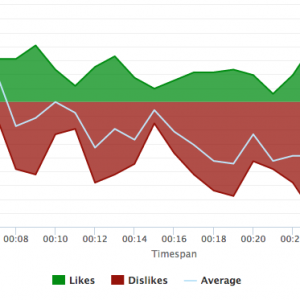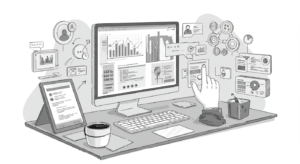AI Brand Health Monitoring: A Comprehensive Guide

In today’s digital world, monitoring the health of your brand is a critical aspect of business. Knowing how your brand is perceived by your customers, potential customers, and competitors can provide invaluable insights into your marketing strategy. However, with the rise of social media and online platforms, keeping track of your brand’s health can be a daunting task. That’s where artificial intelligence (AI) comes in. In this article, we’ll take a closer look at AI brand health monitoring, what it is, why it’s important, and how you can implement it in your organization.
Understanding Brand Health Monitoring
Creating and maintaining a strong brand is essential for any business looking to succeed in today’s competitive market. However, it can be difficult to know how your brand is being perceived by your target audience. This is where brand health monitoring comes in which can be aided by working with companies such as Spot Trender.
What is Brand Health Monitoring?
Brand health monitoring is the practice of measuring and analyzing the health of your brand over time. It involves tracking key metrics such as brand awareness, reputation, engagement, and loyalty, and identifying trends and patterns that can help you make informed decisions about your marketing strategy.
This monitoring can be done in a number of ways, including surveys, social media monitoring, website analytics, and focus groups. By using these methods, you can gain a deeper understanding of how your brand is perceived by your target audience and identify any areas that need improvement.
Why is Brand Health Monitoring Important?
Brand health monitoring provides key insights into how your brand is perceived by your target audience. By keeping track of your brand’s health, you can identify potential issues before they become major problems, monitor the success of your marketing campaigns, and identify areas for improvement. This can help you to build a better brand and ultimately increase sales and revenue.
For example, if you notice that your brand awareness is low among a certain demographic, you can adjust your marketing strategy to better target that audience. Or if you see a decline in customer loyalty, you can take steps to improve your customer service or product offerings.
This process is also important for staying ahead of your competition. By keeping track of your brand’s health, you can identify any emerging trends or changes in your industry and adjust your strategy accordingly.
In conclusion, brand health monitoring is a crucial practice for any business looking to build a strong and successful brand. By measuring and analyzing key metrics, you can gain valuable insights into how your brand is perceived by your target audience and make informed decisions about your marketing strategy.
The Role of Artificial Intelligence in Brand Health Monitoring
AI technology is revolutionizing the way we monitor brand health. By leveraging machine learning algorithms and natural language processing, AI can analyze vast amounts of data from across the web, including social media, review sites, and news articles, to provide deep insights into your brand’s health. Here are some of the ways that AI is being used:
AI-Powered Sentiment Analysis
According to Amazon Web Services, sentiment analysis is the process of analyzing digital text to determine if the emotional tone of the message is positive, negative, or neutral. It uses natural language processing to analyze the tone and emotion behind written text. AI-powered sentiment analysis tools can analyze large volumes of customer feedback across multiple channels, such as social media posts, reviews, and comments.
For example, if a large number of customers are expressing dissatisfaction with a particular aspect of your product or service, an AI-powered sentiment analysis tool can flag this as a potential issue that needs to be addressed. This can help you to proactively address customer issues and improve your brand’s reputation.
Furthermore, sentiment analysis can also help you to identify emerging trends in customer sentiment towards your brand. By tracking changes in sentiment over time, you can gain valuable insights into how your brand is perceived and make data-driven decisions to improve your brand’s health.
AI-Driven Social Media Monitoring
Social media is a critical channel for monitoring brand health. With billions of active users across multiple platforms, it’s important to keep track of what people are saying about your brand online. AI-powered social media monitoring tools can help you to track mentions of your brand across multiple platforms, monitor engagement levels, and identify trends and patterns in customer behavior.
For example, an AI-powered social media monitoring tool can identify when your brand is being mentioned more frequently than usual, or when engagement levels are particularly high or low. This information can help you to optimize your social media strategy and improve your brand’s overall health.
In addition, AI-powered social media monitoring tools can also help you to identify influencers and brand ambassadors who are positively promoting your brand on social media. By leveraging these influencers, you can amplify your brand’s message and reach a wider audience.
AI-Based Competitor Analysis
Competitor analysis is the process of monitoring your competitors’ marketing activities and strategies. By keeping track of what your competitors are doing, you can identify areas where you can differentiate yourself and gain a competitive advantage. AI-based competitor analysis tools can help you to monitor your competitors’ online activity, track their social media mentions and engagement levels, and identify trends and patterns in their marketing strategy.
For example, an AI-based competitor analysis tool can help you to identify which keywords your competitors are targeting in their SEO strategy, or which social media platforms they are most active on. This information can help you to optimize your own marketing strategy and stay one step ahead of your competitors.
In addition, AI-powered competitor analysis tools can also help you to identify gaps in the market that your competitors are not addressing. By identifying these gaps, you can develop new products or services that meet customer needs and gain a competitive advantage.
Conclusion
Overall, the role of artificial intelligence in brand health monitoring is becoming increasingly important in today’s digital age. By leveraging AI-powered tools to analyze vast amounts of data from across the web, brands can gain deep insights into their health and make data-driven decisions to improve their reputation and gain a competitive advantage.
As AI technology continues to evolve, we can expect to see even more advanced tools and capabilities emerge in the field. Brands that embrace these tools and use them to their advantage will be well-positioned to succeed in today’s competitive marketplace.
Key Metrics for AI Brand Health Monitoring
Monitoring your brand’s health with AI is a crucial aspect of ensuring its success. With the help of AI, you can track several key metrics that provide valuable insights into how your brand is performing. These metrics help you identify areas where you need to improve and areas where you are excelling.
Brand Awareness Metrics
Brand awareness is a critical factor in determining the success of any brand. It measures how well-known your brand is among your target audience. There are several metrics that you should track to measure your brand awareness:
- Website Traffic: Your website is the face of your brand online. Tracking your website traffic provides valuable insights into how many people are visiting your website and how they are interacting with it.
- Social Media Followers: Social media is a powerful tool for building brand awareness. Tracking your social media followers helps you understand how many people are interested in your brand and what content they are engaging with.
- Search Engine Rankings: Search engine rankings are a crucial factor in determining how easily your target audience can find your brand online. Tracking your search engine rankings helps you understand how well your brand is performing in search results.
Brand Reputation Metrics
Brand reputation is another critical factor in determining the success of your brand. It measures how your brand is perceived by your target audience. There are several metrics that you should track to measure your brand reputation:
- Customer Satisfaction Scores: Customer satisfaction is a key indicator of how well your brand is performing. Tracking your customer satisfaction scores helps you identify areas where you need to improve and areas where you are excelling.
- Online Reviews: Online reviews are a powerful tool for building brand reputation. Tracking your online reviews helps you understand how your customers perceive your brand and what you can do to improve their experience.
- Sentiment Analysis: Sentiment analysis helps you understand the emotions and opinions expressed by your customers online. Tracking sentiment analysis provides valuable insights into how your brand is perceived and what you can do to improve its reputation.
Brand Engagement Metrics
Brand engagement is a measure of how engaged your audience is with your brand. It is a critical factor in determining the success of your brand. There are several metrics that you should track to measure your brand engagement:
- Social Media Likes, Shares, and Comments: Social media engagement is a powerful tool for building brand engagement. Tracking your social media likes, shares, and comments helps you understand what content is resonating with your audience and what you can do to improve engagement.
- Email Open and Click-Through Rates: Email marketing is a powerful tool for building brand engagement. Tracking your email open and click-through rates provides valuable insights into how your audience is engaging with your email content.
Brand Loyalty Metrics
Brand loyalty is a measure of how loyal your customers are to your brand. It is a critical factor in determining the long-term success of your brand. There are several metrics that you should track to measure your brand loyalty:
- Repeat Purchase Rates: Repeat purchase rates are a key indicator of how loyal your customers are to your brand. Tracking your repeat purchase rates helps you understand how well you are retaining customers and what you can do to improve loyalty.
- Customer Retention Rates: Customer retention rates are another key indicator of how loyal your customers are to your brand. Tracking your customer retention rates helps you understand how well you are retaining customers over time.
- Net Promoter Score: Net promoter score measures how likely your customers are to recommend your brand to others. Tracking your net promoter score provides valuable insights into how well you are satisfying your customers and how likely they are to become brand advocates.
By tracking these key metrics, you can gain valuable insights into how your brand is performing and what you can do to improve its health. With the help of AI, you can track these metrics in real-time and make data-driven decisions that drive the success of your brand.
Implementing AI Brand Health Monitoring Tools
Choosing the Right AI-Powered Tool
There are many AI-powered brand health monitoring tools on the market today. When choosing a tool, it’s important to consider your organization’s specific needs and goals. Some key factors to consider include:
- Price
- Features
- Data sources supported
- User interface and ease of use
- Customer support and training
Integrating AI Tools into Your Marketing Strategy
Once you’ve chosen a the right monitoring tool, it’s important to integrate it into your marketing strategy. This involves defining key metrics to track, setting up alerts and notifications for important events, and regularly reviewing and analyzing your data.
Training Your Team on AI Brand Health Monitoring
Finally, it’s important to ensure that your team is trained on how to use AI-powered brand health monitoring tools effectively. This may involve providing training sessions, creating user guides, or working with your vendor to provide support and training.
Conclusion
AI brand health monitoring is a powerful tool for businesses looking to stay ahead of the competition and build a better brand. By leveraging AI technology and tracking key metrics, you can gain deep insights into how your brand is perceived by your target audience, identify potential issues, and make informed decisions about your marketing strategy. By following the best practices outlined in this guide, you can successfully implement AI brand health monitoring in your organization and take your brand to the next level.







